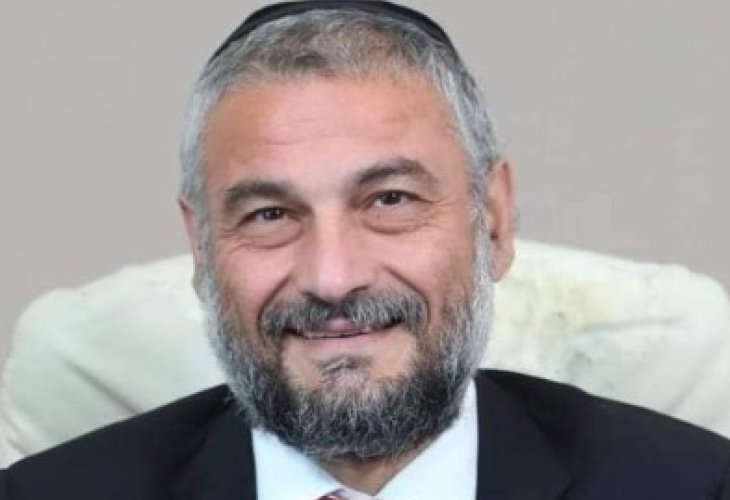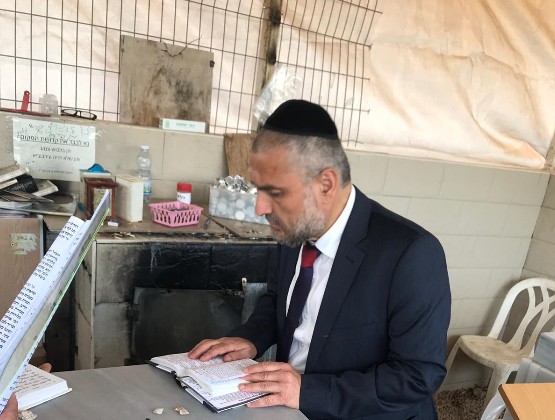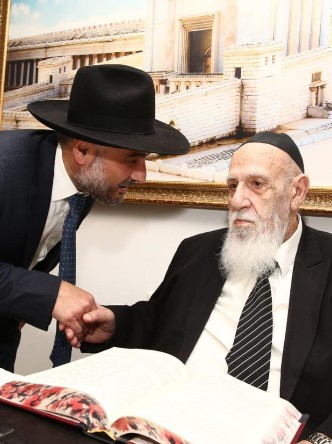(Soon) MK Moshe Abutbul in an Exclusive Interview: "I am the Election Bonus"
He grew up in a disadvantaged neighborhood, returned to religious observance in fifth grade, and studied in yeshivas. In his youth, he visited prisoners, managed yeshiva enrollment, and later became Mayor of Beit Shemesh. Soon, he will hold the title 'Shas's New Knesset Member'. Moshe Abutbul wraps up an election campaign and reveals a life story you never knew. Exclusive Interview.

Moshe Abutbul, the soon-to-be new Knesset member for Shas, is mostly known for his previous title as Mayor of Beit Shemesh. For ten years, he led a city characterized by its diverse population: from Neturei Karta to secular people, native Israelis to new immigrants, young couples to older families—a city dealing with various challenges and numerous building projects. No wonder Abutbul frequently made headlines for his efforts to bridge gaps, mediate, and advance all possible initiatives.
In the recent municipal elections, Abutbul's name resurfaced when he narrowly lost the race for mayor by 250 votes to Dr. Aliza Bloch. She took office, and Abutbul, who had to retire, foresaw early on that his future lay in politics. He didn't predict, however, that the opportunity would come this year, after Shas secured a significant gain of nine mandates in the election, allowing him to become a full-fledged Knesset member as ninth on the party's list.
Until now, these facts are more or less known. However, Moshe Abutbul, the smiling 54-year-old Jewish man, also has a fascinating life story that the public is less aware of. Just before he enters the Knesset, we wanted to hear about it and also reveal some of the plans he intends to promote in his new role.

The Child from Be'er Sheva
"I grew up in a non-religious home," begins Abutbul. "In my childhood, I attended the 'Tze'elim' state school in Be'er Sheva. In fourth grade, a religious teacher taught me. She was actually the one who introduced me to Judaism for the first time. Thanks to her, I first heard about the Jewish holidays and religious customs. She sparked my curiosity, and by the end of the year, she directed me to Torah classes with Rabbi Eliezer Klein in Be'er Sheva. Rabbi Klein's lessons resonated with me greatly, and as a result, I decided to leave the secular school. I moved to the 'Blumenthal Home' boarding school in Jerusalem, where I studied until eighth grade. I would travel alone on buses for hours. It wasn't easy, but I never regretted it."
What did your parents say about their child suddenly deciding to change schools?
"I owe so much gratitude to my parents for cooperating with the change I initiated and even supporting me. I think they simply saw the neighbor's children in Neighborhood D where we lived fall into drugs and crime. They understood that by going to religious institutions, I was essentially saving myself. My mom once told me she overheard a neighbor say, 'I'd rather my son be a criminal than be religious.' She was shocked by the statement and later told me she'd do everything necessary for me, including preparing the kitchen, buying kosher food, and so on."
When Abutbul finished his studies in eighth grade, he continued to Yeshivat Itri and was already deeply involved in outreach activities. "As a yeshiva student," he recalls, "I would spend Rosh Hashanah, Yom Kippur, and Passover Seder with prisoners in the Be’er Sheva jails, acting as cantor and conducting the seder. Many were notorious criminals, but I tried not to think about their past, instead focusing on encouraging and uplifting them."
Weren't you afraid to enter such places, especially at such a young age?
"It's true, I was young, but I was very connected to Rabbi Ovadia Yosef's approach. He always emphasized that these people might appear outwardly rebellious, but the closer you get to them, the more diamonds you discover. That was his way."
Additionally, during those years, Abutbul was involved in enrolling students to religious institutions like Yeshivat Itri and Kiryat HaYeled. He would travel around towns near Beit Shemesh, known as 'Mateh Yehuda', and recruit students from there.
After marriage, he spent a year studying in a kollel and then started teaching. A few years later, he moved to Beit Shemesh and began teaching in Rabbi Reuven Elbaz's institutions. From there, he was drawn into politics when Rabbi Elbaz asked him to serve as a council member for Shas, leading to his appointment as deputy mayor, acting mayor, and ultimately serving ten years as Mayor of Beit Shemesh. "In all my roles, I tried to strengthen the world of return to faith. Torah classes and outreach are things that matter most to me. It’s clear to me that this hastens the complete redemption," he passionately states.
How do you feel knowing that, in contrast to the blessed return to faith, Beit Shemesh also faces a significant dropout challenge?
"First of all, I don't think there's more dropout in Beit Shemesh than in other cities. Beyond that, I'm proud that we don’t only have dropout, but also wonderful organizations doing holy work to treat and support the youth. There are frameworks and organizations doing great work. This is our response to the youth needing guidance. They are diamonds. I can simply say that I 'adore' these youngsters. They only put on a show on the outside, but inside, they truly fear Hashem. Many of them might take a short detour outside but will eventually return home as they realize there’s no warmth like home."

"I Don't Want to Be a Minister"
Abutbul also reached the national stage with the full encouragement of Rabbi Elbaz. "The Rabbi told me he is sure I have a lot to contribute to Knesset committees like the Welfare, Education, and Immigration Committees, thanks to my accumulated experience, which could greatly benefit the Knesset and government. Of course, there was also the significant push from the movement's chairman, Minister Aryeh Deri."
You were placed at number 9. It was a realistic spot, but not entirely guaranteed. Without a second round of elections, you wouldn’t have become a member of Knesset.
"From the start, they placed me in a very borderline spot, but the party assumed there was a high probability that Shas would be in the government and ministers would enact the Norwegian Law, allowing me to enter through the side door. Ultimately, Hashem, who orchestrates all events, made it so that Lieberman went overboard, prompting another election. Thus, with Hashem’s help, I entered through the front door. You could say I'm the bonus of the elections."
In which role do you think you can serve the public more – as a Knesset member or as a mayor?
"I believe both roles can help the public, each in its own way, and they aren’t comparable. It’s like asking whether hands or feet are more important. Obviously, both are necessary, but each has a different use. As Mayor, I was mainly involved in the daily Sisyphean work in the municipality, managing a billion-shekel budget. I managed to add about 500 classrooms, built playgrounds, moved the city hall to a more modern location, and undertook many other important and beautiful actions. As a Knesset member, the role is different, and in addition to action, there's also significant representation. It doesn't diminish governmental work compared to city work because one can achieve great things on the national stage. I plan to utilize these tools to the fullest."
Do you have specific plans?
"Certainly. I don't plan to be a dormant Knesset member, and I have some big dreams I intend to fulfill. Among other things, I aspire to promote establishing a hospital in Beit Shemesh spanning 120 dunams. It’s unacceptable that a city with 5,000 new babies added annually doesn't have a hospital, forcing mothers to travel to Jerusalem. I also have a major interest in helping large families and modifying laws I encountered as obstructions in my work as Mayor, such as property tax, transportation issues, and more. Throughout my mayoral tenure, I kept telling myself, 'If I were a Knesset member, I’d do this and that,' and now the opportunity has come. I also have plans for several new laws that will be known in future days as 'Abutbul Laws'."
Which ministerial role would you prefer if offered?
"I don’t think it suits me to serve as a minister. I am young in Knesset work, and there are better and more experienced people. I assume and hope that one day I can progress in that direction, but it doesn’t need to happen right at the start. I prefer to first invest in Knesset work and leave my mark through hard work. Whatever happens afterward will be decided by Hashem, and I'll do as the great Rabbis of Israel instruct me."
If you find yourselves in the opposition, do you believe you'd still be able to influence and realize your many plans?
"There’s no doubt that you can significantly influence and fight for issues important to the religious Jews even from the opposition. Every role can serve the public. There were years when I was in the opposition of Beit Shemesh Municipality, and I made the mayor's life difficult until he realized that success required the religious, which brought us inside and made us his right hand."
In conclusion, how do you explain Shas's great success in the last election cycle?
"I believe several factors led to the success. The main and foremost reason is, of course, the prayers of the great Rabbis of Israel. Anyone who saw Rav Shalom Cohen crying about the decline of the movement due to voters' weakening understands what I mean. The great Rav Reuven Elbaz, Rabbi Zamir Cohen, and other important Rabbis were genuinely in great anxiety, encouraging and prompting the public, who participated actively and displayed immense strength, far beyond what we knew in the past."
"Additionally, there was the wonderful unity between all sectors of the religious society. Everyone gathered and came to vote, even those who were previously somewhat distant and didn’t involve themselves in the political arena. Above all, there was the special work of the movement’s chairman, Aryeh Deri, who literally jumped from city to city and village to village to unite and gather everyone, fostering peace."
"We also cannot ignore the enormous contribution of outreach organizations, which, for years, have been doing holy work, dedicating themselves to enlightening the path and benefiting the many. There is continuous growth among returnees to the faith, and as is known, many of them vote for Shas."

